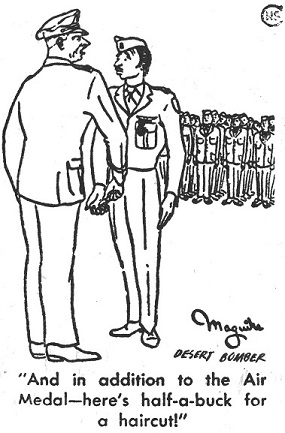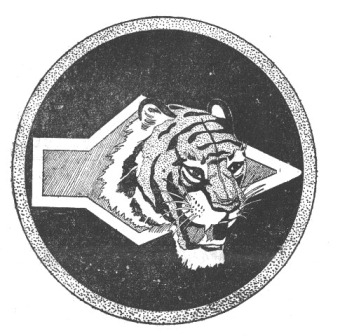

Vol. II No. 28 BENGAL AIR DEPOT JUNE 23rd, 1945
FIRST ARREST SLOWS PETTY THIEVERY
|
EIGHT AWARDED BURMA BRONZE STAR
Depot Soldiers Transported Three Locomotives Over Manipur Road Eight men, recently returned to this Depot from Central Burma, were this week authorized the Bronze Star for their participation in that campaign from 27 March to 9 June 1945. The men are: Sgt. Harold E. Cross, Sgt. George E. DeBord, Cpl. George Gantz, Jr., T/5 Frank D. Claypool, Pfc. James J. Launius, Pfc. Thomas L. Dwinnell, Pfc. Oral M. Melvin and Pfc. Robert R. Walker. Under the supervision of Lt. Col. M. B. Richardson, the Liaison Officer at ALFSEA, the men transported three locomotives to Myingyan via the Manipur road into Burma. Enroute with the engines to their destination the men ran across many late traces of the retreating Jap and saw many destroyed bunkers, tanks, and other enemy equipment scattered along their path. "In Burma," one of the men reminisced, "we saw many Naga tribesmen. They're husky strapping fellows, and because of the steep hills hemming that territory their leg muscles, especially, are bunched like whipcord from walking the hills and living in the bush." "The Nagas," another man picked up the conversation, "get a bounty on all the Jap heads they bring in and they bring in plenty of them. They're really rough looking and tough boys and certainly help out the Allied troops." Moving deeper with their equipment the men found much of interest during their stay in Burma. They told of flushing out deer, monkeys, panthers and other cats, and listening to their occasional screams which ripped through the night and cut the silence. "At night," another man said, "campfires of the tribesmen gleamed and dotted all through the mountains. It's high country there, about 8,000 or more feet above sea level, and the nights are very cool. The clouds sit right down on the ground." The men encountered many temples and places of worship and were surprised at the prodigious number. One of their best memories and a highlight of their equipment bearing journey was a 75 foot high statue. Representing some goddess, the idol was of beautiful construction and inlaid with finely cut pieces of mirror and brilliant colored glass. But the thing they enjoyed the most of their transporting trek was the many Nipponese planes which lay crumpled, burnt, and twisted both on recaptured airfields and half hidden in the growing grass. This, they really enjoyed and was a perpetual reminder that although they weren't pilots, locomotives could help finish the Japs too. |
ALERTNESS OF GI CATCHES THIEF WITH GOODS
GI alertness resulting in the capture of a bearer with stolen property, was disclosed this week by the Provost Marshal Office.
The alert GI is S/Sgt. John T. Zett of a Signal outfit based here. The culprit was a new bearer, never cleared by Civilian Personnel, who had been substituting for a vacationing friend.
Sgt. Zett had his suspicion aroused because of the constant disappearance of small items such as cigars, packages of cigarettes, t-shirts and other miscellaneous objects. However, continual observation revealed nothing and since the man was a hard worker matters rested for a month.
Late last week Sgt. Zett returned earlier than usual to find the barrack deserted save for the bearer apparently on his way out with a bag of laundry. Sgt. Zett obeyed a hunch and motioned the bearer to spill out the contents. When the man proved reluctant, Zett seized the bag and poured out the insides. Out cascaded cans of fruit and vegetable juices, Zett's cigarette case, packs of cigarettes and a pair of GI glasses.
Notwithstanding the bearer's whimperings and pleadings, he was immediately turned over to the Provost Marshal Office for further action.
Despite this initial success in the current round of petty thievery, Cpl. Russell M. Stewart of the Provost Marshal Office warned that some of the men were still lax in caring for their property. Between the hours of midnight and six a.m. Monday, a sneak broke into the "Pittsburger" and reaped a harvest in fountain pens, automatic pencils, rupees, and cigarette lighters.
"Until we round up the individuals responsible for the crime wave, every GI should be particularly careful how he looks after his valuables. This warning cannot be given and repeated often enough."
FOUR YEAR SEARCH FOR MOTHER ENDED
A four year search through three European countries finally rewarded Pvt. Chris T. Collier of a quartermaster outfit with the reassuring news that his mother and sister were alive and well.
As if from the pages of an Oppenheim novel, intrigue, smuggling and international tentacles of the ARC, all came through to gladden Chris. "I doubt if you can find a happier fellow on the Depot. I sure owe a lot to the ARC."
Chris' family originally came from Corfu, the playland of Greece, although Chris, a brother Ulysses and a sister were all born in Ohio. When the depression came in 1930, everyone save the father went back to Greece. Easing conditions permitted Chris' return in 1935 and his brother a year later. "Transportation difficulties delayed Mom's return and when the war broke out in 1939 we ran into a lot of red tape because she wasn't a citizen. Sister stayed with her. Then Mom decided to see her folks in Titania, Albania, and was there when Mussolini took over. From then on it was a blackout on news from them."
A few days after Pearl Harbor, Ulysses enlisted in the Navy and Chris followed in October 1942. They secured the aid of the ARC whose personnel combed Corfu, Greece, Italy and Albania. Finally in June 1944 a short message was relayed through ARC channels: "We are well, do not worry." No source nor explanation accompanied it.
Again a news blackout until this past month. A dirty, crinkled, undated envelope arrived - apparently smuggled out of Albania and long on its way. The mother and sister were well, cheerful and looked forward to meeting Chris and the family. The ARC had contacted them and reassured.
So Chris is relaxed these days and dreams a little of the time when the Colliers can be reunited.
Forty Receive Driver Awards
Forty cautious individuals were awarded the Motor Vehicle Drivers award this week on orders emanating from headquarters.
This award is given only to drivers who have sustained no accidents or traffic violations for three months and have a rating of "excellent" on their jobs.
Considering the giddy pace traffic follows enroute to Calcutta, and the erratic actions of pedestrians along the highway, this award is no mean receipt.
VETERAN PX OFFICER TAKES OVER
Capt. Charles B. Hemenway, new PX officer who has 18 months PX service in India, has already inaugurated certain innovations which will considerably dress up the PX.
Items that have been gathering dust will be cleared out and stock rearranged so that closely related items can all be purchased at one spot rather than at various counters as in the past. A much larger stock of the merchandise the men prefer will be carried. The captain continued: "Don't expect me to perform miracles here. I said a year ago and I repeat. The GIs have one of the best PX's in the IBT here with numerous items unobtainable elsewhere. Most of the excellent services introduced by my predecessor, Maj. Johnson, will be continued and any not meeting with theater standards will be improved."
As a preview of some of his plans, Capt. Hemenway opened his 'treasure chest' of items to be placed on sale, through company selections, once the regular inventory is taken. The latest designed Longine and other American make wrist-watches, silver teaspoon sets enclosed in leatherette cases, Ronson whirlwind and other make lighters, and ample stocks of various fountain pens are just a few of the temptations to unburden GI wallets.

NIGHTMARE
Prickly heat rash, heat exhaustion and the monsoons are three subjects which are more often than not the topic of conversation on the Depot now, whenever two or more suffering GIs gather to bare their souls.
There appears to be little that can be done to eliminate prickly heat rash - sudden inspirations of your buddies to the contrary. Since American troops hit this theater there have been innumerable suggestions advanced by way of combating this scourge of working men in the tropics. The medics admit having nothing to cure the rash; the calamine lotion that is given to itching GIs will give but temporary alleviation. That same momentary relief can be obtained by standing under a shower and allowing the water to pour over the sorely beset skin.
One suggestion that was widely followed last year was that rain water was a cure-all. To the discouragement of success-seeking GIs, hundreds who stood under the pelting monsoon drenchings found that it is no different than the relief obtained under the wash room showers.
For those men who are new to the theater and have not as yet found themselves the victims of this excruciating ailment that seems to be as much a part of military life in Bengal as khakis, a slight description may help to orient them. It will, if they bear in mind that words cannot possibly convey the misery experienced.
The rash appears in the form of tiny red pimples that quickly increase to varying degrees. The usual initial appearance of the rash is on the back and shoulders. It can and does spread to where it covers a man's body. A visit to a shower room will illustrate that. These tiny pimples keep the body heated and give the sufferer a tingling, itching sensation that can, in time, bring one to the point of cutting paper dolls. An intense desire to scratch - which only makes it worse - follows and an afflicted individual can usually be seen rubbing various parts of his anatomy. The prickling sensation is with the rash victim night and day. So much so that sleep becomes a distant memory and something to be sought after in much the same manner of Richard Conway seeking Shangri La in James Hilton's Lost Horizon. It is pure, unadulterated agony.
Heat exhaustion can more easily be prevented. The army makes available sufficient salt, in both tablet and crystal form, for the soldier to imbibe freely.
|
The monsoons will mean comparatively cooler weather - and if it lasts long enough, most prickly heat rashes will disappear. But the monsoon bring their own problems. Woolen clothing becomes moldy and clothes are almost continually damp. About the best things to do with the woolens is air them frequently and brush them even more frequently. The damp clothes? We're open for suggestions.
When the wind comes along to boost the rain, brother! No matter how good a roof you've on your basha you'll get wet. The rain is driven into every crack and crevice of the walls by the terrific velocity of the wind. It rains with much the same consistency that the sun burns in April-May-June and there isn't a thing you can do about it.
What can be done about all these things that make even rear echelon work in India a trying job at best? Not a heck of a lot. If you're a philosopher and can see good in everything, well and good. But if you're like us, you'll just look up at the heavens and hope. It does end eventually.
The Bengal Air Depot - A Year Ago
Culled From Tiger Rag Files
A VIOLENT wind-rain storm tore the roof off the post theater projector booth, damaged much of the equipment inside and lifted several sections of the headquarters building roofing - to provide local prickly heat sufferers with a new subject of conversation. The storm's worst damage was in making the showing of movies, the chief source of entertainment, impossible for almost a whole week. Most of the unit columns in the Tiger Rag told about the moanings and attempts of GIs to alleviate that devastating scourge, prickly heat rash.
The work of the telephone switchboard operators - at that time they were all GIs - was delineated in a feature article while "rap, rap, rap!" was making the rounds as a result of a short story which appeared in the Tiger Rag under the title of "Horror Stalks the Depot."
Editor Hollis Estill and artist Layton Wicksten went on rest leave, leaving the present editor in the position of being a "one man newspaper" while T/5 Al Pharo in his "Beat It Out" column did the unusual by giving his unit's mess personnel a pat on the back.
S/Sgt. Don Seeman, who affixed the "Nicotine" signature to his "Broadway" column, wrote:
"And the rains came - For the last week, all the boys seemed to be afflicted with that soothing feeling called prickly heat... and to add salt to their wounds, the loquacious Indian weather emitted all its hot air in five of the worst days known to mankind. What with all the suffering throughout the area, Sunday morning brought a great percentage of the men out into the blazing morning sun to attend church services and pray for the belated rain to render its welcomed wrath on all mankind. And so it came to pass that late in the burning afternoon with everyone standing around, hands outstretched calling 'panee! panee!,' the great Barun answered their prayers and opened up with a windy escort amid the 'ahs' and 'ohs' and drenched undershorts of all concerned. All optimism was thwarted, however, when during the following morning old Sol persisted in thrusting his head between the clouds."

The largest city in India - Calcutta - is today a busy military center as uniformed personnel of India, China, Britain and the United States brush shoulders in work and play. To the burden thrown on the city's inadequate transportation system by over two million residents is added the many thousand troops whose efforts in supplying combat troops in Burma and China has resulted in many unprecedented feats.
The streets are crowded with military vehicles of every description and use and numerous charcoal driven civil vehicles - and all is turned into utter chaos by the horse-drawn gharries and coolie-drawn rickshaws which dart in and out of traffic with no appreciation of what they are precipitating.
The sidewalks and dining places, especially in the part of town along Chowringhee Road - the Broadway of the city - between the Hindusthan building just a block off and Park Square are a polyglot of Indians from all over the country and soldiers from all over the world.
The recently lifted dim-out has permitted safer driving and saner navigation down the streets during the night; the removal of most of the blast walls has eliminated an eyesore from the scene. Although Calcutta was bombed a few times little damage was incurred. Impeccably clean in some sections Calcutta is unbelievably filthy in more districts. It is a city of sharp contrasts between European and Indian customs and modern and outdated outlook.
Famed for its rampant prostitution and large port the city has watched its cost of living rise to phenomenal heights. But for all its shabbiness - increased because of neglect due to war - the city retains sufficient points of beauty and interest to satisfy even the most eager visitor. The spacious Maidan (Hindusthani for park) is dotted with statues and trees and flanked by public and private buildings. Within its grounds are now motor pools and camps of the U.S. Army. The picturesque Victoria Memorial is near the center. Eden Gardens, a large public garden, is at the northwest extremity. The Race Course, dating from 1819 and said to be one of the world's finest, is within it. Fort William, which has never fired its guns excepting in salvoes for visiting Viceroys and rulers of Indian States, is at the southwest tip. The largest Mohammedan mosque, Nakhoda Mosque, is capable of accommodating over 10,000 persons. The New Market, probably the largest market in the East is a tremendous building housing hundreds of stalls. There are many more interesting places in the city, too many to be mentioned here.
Two large American Red Cross clubs are located in the city. The Burra Club at 8 Dalhousie Square and the newer Club 60, at 60 Chowringhee Road, both cater to GIs and bend every effort to make their stay in Calcutta as pleasant as possible. Both clubs have large dining rooms, where GIs can obtain fine meals at nominal cost, dormitories to accommodate transient and furloughing soldiers, and activities to keep the GI happy.
A rest camp, predominantly for GIs from Burma and up-country, is situated in the outskirts of the town. An Armed Forces Radio Station, VU2ZU, operated by American military personnel, is utilized to entertain and inform local soldiers. Recordings of American programs and local talent gives the radio listener much entertainment.
American movies are shown at several movie houses, although the movies are usually at least a year old by the time they reach India.
Three-quarters of the civil population is Huindu with almost half a million Muslims furnishing the other predominant religion. Another hundred thousand people's faiths range from Buddhism to Christianity - missing none between.
The prominence of Calcutta lies in its port. About one-half of the total sea-borne traffic of India passes through Calcutta. The great jute industry of Bengal, the sea industries of Assam, the coal and mica of Bengal and Bihar, the wheat of the UP and the agricultural areas in the east converge on Calcutta.
The climate is - to express it unbiasedly - tropical. Temperature ranges from the low of 45 degrees to the high of 106 degrees. What makes Calcutta and Bengal so uncomfortable is the humidity. The monsoon days are warm and damp, decidedly annoying to put it mildly. The cool season, which extends from November to March, is the most pleasant season of the year.
This is the city where the GIs of the Bengal Air Depot go in search of amusement and a change from army routine. Contrasting, informative and a source of scant amusement.
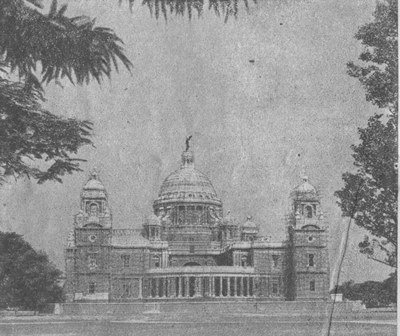 One of Calcutta's most beautiful buildings, Victoria Memorial, located in the Maidan.
Opened by Edward Prince of Wales in 1921; this edifice was erected with funds subscribed by the people of India.
The scaffolding was originally placed around the building for protection against bomb blast but is now used for cleaning purposes.
It is closed for the duration but contains a treasure of relics, paintings, statues and papers relating to British-Indian history.
Built of Jupiter marble, this building dominates the Maidan.
One of Calcutta's most beautiful buildings, Victoria Memorial, located in the Maidan.
Opened by Edward Prince of Wales in 1921; this edifice was erected with funds subscribed by the people of India.
The scaffolding was originally placed around the building for protection against bomb blast but is now used for cleaning purposes.
It is closed for the duration but contains a treasure of relics, paintings, statues and papers relating to British-Indian history.
Built of Jupiter marble, this building dominates the Maidan.
|
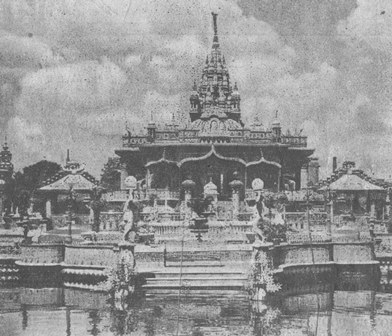 A lamp has been burning within Jain Temple for seventy-six years.
Erected in 1867 the temple is a composite of various types of architecture.
Jainism is the only one of the almost primeval monastic orders of India which has survived to the present day.
There are twenty-four Jain Gods.
Located in one of the less wealthy sections of Calcutta.
A lamp has been burning within Jain Temple for seventy-six years.
Erected in 1867 the temple is a composite of various types of architecture.
Jainism is the only one of the almost primeval monastic orders of India which has survived to the present day.
There are twenty-four Jain Gods.
Located in one of the less wealthy sections of Calcutta.
|
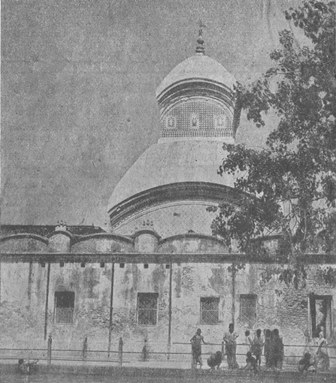 Goats are sacrificed to the Goddess Kali in the court in front of Kalighat Temple.
Kali's body is alleged to have broken into fifty-one pieces, with a toe falling where the temple now stands.
A statue of the goddess is within.
Pilgrims make offerings here.
The Champa tree, where Hindu women come to pray when they desire sons, is located here, too.
Goats are sacrificed to the Goddess Kali in the court in front of Kalighat Temple.
Kali's body is alleged to have broken into fifty-one pieces, with a toe falling where the temple now stands.
A statue of the goddess is within.
Pilgrims make offerings here.
The Champa tree, where Hindu women come to pray when they desire sons, is located here, too.
|
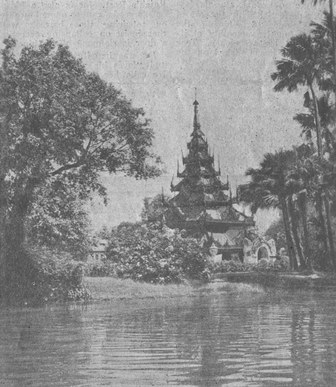 This Burmese Pagoda is in the Eden Gardens, the public garden located at the Hooghly River extremity of the Maidan.
This specimen of Burmese ornamental architecture was removed from Prome, in southern Burma, in 1854 and reconstructed on its present site in the latter part of 1856.
This Burmese Pagoda is in the Eden Gardens, the public garden located at the Hooghly River extremity of the Maidan.
This specimen of Burmese ornamental architecture was removed from Prome, in southern Burma, in 1854 and reconstructed on its present site in the latter part of 1856.
|
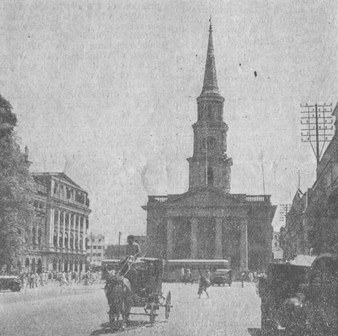 Built in 1813, the Town Hall of Calcutta is situated on Dalhousie Square East, just a few short steps from the American Red Cross Burra Club.
The Hall cost Rs seven lakhs (roughly a little over $200,000).
It is a silent sentinel in the square, which is just off the business district and into which runs Clive Street, The Wall Street of the city.
Built in 1813, the Town Hall of Calcutta is situated on Dalhousie Square East, just a few short steps from the American Red Cross Burra Club.
The Hall cost Rs seven lakhs (roughly a little over $200,000).
It is a silent sentinel in the square, which is just off the business district and into which runs Clive Street, The Wall Street of the city.
|
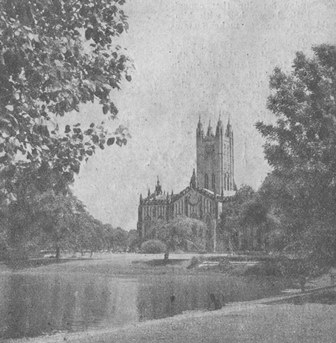 St. Paul's Cathedral, situated in the Maidan, was completed in 1847 and is one of the finest structures of its type in Calcutta.
The Cathedral contains many fine stained glass windows, statues and portraits.
This is but one of many fine places of worship of all religions that exist in Calcutta.
St. Paul's Cathedral, situated in the Maidan, was completed in 1847 and is one of the finest structures of its type in Calcutta.
The Cathedral contains many fine stained glass windows, statues and portraits.
This is but one of many fine places of worship of all religions that exist in Calcutta.
|
Suspension of Air Travel to U.S. on TDY Lifted
Key personnel on the Depot who have hesitated applying for the War Department's 45-day TDY in the States in lieu of rotation because of the suspension of air travel may now plunge boldly ahead - for the air travel suspension has been lifted.
An IBT circular dated 1 June announced the lifting of the suspension while at the same time stating that rotation had been suspended. The circular stated that the "Temporary Duty for Purposes of Rehabilitation, Recuperation and Recovery" will be on a quota basis - the quotas to be announced each month by Replacement Service.
GIs wishing to apply for this opportunity to visit the States for 45 days must have served 24 continuous months of overseas service, except in exceptional cases, before they can leave the theater. They must state that they will return to their overseas station for one year from the date of their arrival back from the TDY.
We Rate Fifth in Safety in IBT
In the regular meeting of the Ground Safety Committee 13 June 1945 it was revealed that the Bengal Air Depot ranked fifth on military and civilian accidents in this theater for the month of April. However, May's figures on accidents to military personnel doubled over April and it was felt an increased laxity on individual caution was responsible.
Causes varied, such as jay walking, motor vehicle accidents, drunkenness, and ball playing. These can only be controlled and eliminated by personnel cognizance and perpetual carefulness on the part of all personnel.
One civilian employee was involved in an accident which necessitated amputation of the right foot. The accident might have been avoided but carelessness on the part of another individual brought it about. So be careful and watch others as well as yourself for there the unexpected danger arises.
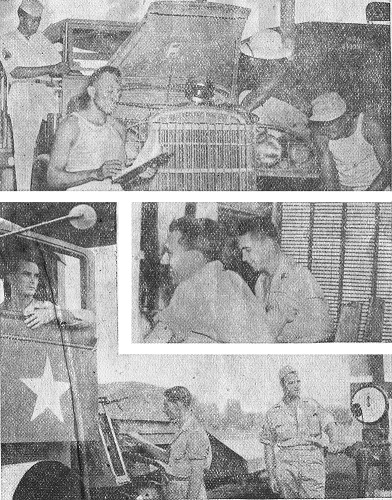 Top: 1st Echelon Garage operations with left to right: S/Sgt. William Fuller, Motor Sergeant, investigating repairs,
S/Sgt. Archie Terry glancing at work schedule, Sgt. Lonnie J. Trice inspecting the bumper, and Pvt. William T. Mitchell making final adjustments on engine.
Top: 1st Echelon Garage operations with left to right: S/Sgt. William Fuller, Motor Sergeant, investigating repairs,
S/Sgt. Archie Terry glancing at work schedule, Sgt. Lonnie J. Trice inspecting the bumper, and Pvt. William T. Mitchell making final adjustments on engine.
Center: Dispatchers Office with Sgt. Howard Smith receiving a transportation request while Lt. James McAnelly checks routing report. Bottom: At the Gas Station T/5 Marvin H. Enninga gets ready to take off as Pfc. Jerry F. Javurek fills her up with Sgt. Theodore Wojcik reads the gallonage. |
Makes Supply Function Possible
It took Jules Verne's fabulous heroes 90 days to go only once around the world, yet in one third that time the Depot's vehicles average enough mileage to encircle the globe 26 times.
To control and wisely expand this span of miles is but a mere stride in the duty path of the Motor Transportation Officer, Maj. Charles C. Campbell of Adamsville, Tenn., at present on rest leave. Another step and a daily minor miracle is the transporting to and fro of a civilian personnel equal to the population of a fair sized town.
A glance at the huge sprawling Motor Pool portrays the reasons why Maj. Campbell is kept busy. Under the supervision of the Depot Quartermaster, he is responsible for the efficient operation of the Motor Pool and the repair of all equipment assigned to the Pool. A task which has only been made easy by the ingenuity, skill, and eternal vigilance of the Motor Pool's personnel.
MOTOR TRANSPORTATION OFFICE
No mad hustling or urgent ringing of voices greets the visitor who steps into the calm little wooden structure that houses Maj. Campbell's office. Efficiency reigns throughout. Here one is welcomed by husky, prematurely graying Lt. Emerson N. Price of Venita, Calif., upon whom, as Asst. Transportation Officer, rests the responsibilities of being acquainted with and carrying out the policies set forth by Maj. Campbell. It is Lt. Price who controls the records and requisitioning of all Motor Pool personnel, military or civilian.
Lt. Price, whose auto supply business is still operating, has nothing but praise for the personnel of the Motor Pool. "Each and every one of them has numerous problems to meet here and the way they tackle and solve their tasks spells finish to any hopes the Japs have."
CHIEF CLERK
The competence and dignity of the MTO is due in part to the firm handling of darkish, quiet T/Sgt. George E. Bishop who keeps track of everything going on and at a moment's notice can give any required detail about the multitudinous workings of the Motor Pool. He somehow handles a volume of detail and correspondence that would ordinarily use up many minds and hands.
A native of Los Angles, Calif., it is only by the grace of his draft board that George is not an officer today. George had the rank of captain in the Civil Air Patrol, being Training and Operations Officer at Riverside, Calif. It was only a short time after his induction that the Army absorbed the CAP. The present gleam in George's eye is that electrical appliance business he hopes to set up shortly as he is rapidly approaching his fortieth year.
Bishop's only assistant is rangy, mustached T/5 Herman Obrecht of Bangor, Pa., who handles and breaks down into statistics the trips taken the day before. Herman is going back to that textile machine operator's job he had before being snatched.
1ST ECHELON MAINTENANCE
The tall officer who stepped in to consult Bishop turned out to be Lt. Leland L. Estep of San Antonio, Texas, with 11 years of Army service of which seven were in the ranks. He was enthusiastic about the men with whom he recently came over, most of whom are attached in one way or another to the Motor Pool.
Lt. Estep is in charge of the 1st Echelon Garages and sees that proper maintenance is performed on every piece of equipment assigned to the Motor Pool. The work is split up so that one group of men look after the light vehicles and another the heavier trucks and trailers. The Motor Sergeants attached to the Dispatcher's Office control the servicing of their outfit's vehicles. Actual work is performed by the individual drivers with the assistance of the 1st Echelon personnel.
At the lighter vehicle hut, Lt. James F. Bain of Corpus Christi, Texas temporarily holds sway. He gives full credit for the effectual operation of his department to the mechanics whose work is assigned and recorded by T/5 Louis Hodge of Detroit, Mich. Photography-minded Louis' assistants are Pvts. William H. Thomas of Wilmington, Del., William Mitchell of Pittsburgh, Pa. and John Debose of Shreveport, La.
The 1st Echelon heavier vehicle haven is divided into six stalls, the Quartermasters using four and the other two split among the other organizations of the Motor Pool.
One of the busiest stalls is under the joint operation of S/Sgts. Julius Wadley of Newark, N.J. and Archie Terry of Chicago, Ill., with Sgt. Lonnie J. Trice of St. Louis their able abettor. Julius plans to go back to his National Youth Administration position while Archie is entering the Tailor and Dry Cleaning business.
At another stall is nimble S/Sgt. Harry R. Smith of Pauling, Ohio who is post war school minded because of the GI Bill. His assistant is T/5 Waldon P. Lewis, a concrete man from Dallas, Texas. S/Sgt. Anton Bukauskas, Chicago's own, runs a third stall and will be the entrepreneur of groceries and meats after it's all over.
Pfc. "RB" Tanery from Anderson, S.C., was in a huddle in yet another stall with truck drivers Cpl. Ernst R. Smith, San Antonio's best, and Pfc. James F. Hollis, Jr., from Martinsburg, W.Va. with babu T/3 Silvio A. Cancro of the Bronx, N.Y. acting as referee. Hollis explained that these question bees helped him to continue operations.
GAS STATION
A boon to the industrious vehicle drivers is the well-run Gas Station which disperses the motivating fluid with the minimum of delay. Its commander is astute Sgt. Theodore Wojcik who has still the pep and enthusiasm he came over with 23 months ago. A bachelor welder from Taunton, Mass., he plans to go into a bulk oil plant when that day arrives.
Day and night operation causes the gas station personnel to run on three shifts. The earliest is handled by bulky Pfc. John B. Hawkes of Nicholson, Ga., a farmer who has been around the pumps so long he plans to make a career of it with money borrowed under the GI Bill plan.
Pfc. Henry J. Cooper works a second shift but spends a lot of time convincing everyone that the fairest of the fair is Severville, Tenn. Pfc. Jerry F. Javurek is just as noisy about Chicago.
DISPATCHER'S OFFICE
The core of the entire Motor Pool system upon which converges the full-tilt scramble of motor transportation is the Dispatcher's Office.
Lord of this tempestuous manor is Lt. James McAnelly, rustled from Ft. Worth, Texas, and at heart still a member of Texas A & M where he plans to go back to finish schooling. Plucked from his ROTC unit to enter Army life, he feels it is fate that led him to Massachusetts, where he met the Miss Mae Dudek, the only pin-up in the office.
It is Lt. McAnelly who receives the multitudinous requests for vehicles, separates the wheat from the chaff, and makes every effort to consolidate dispatches to economize on the use of motor transportation. With the phone in one hand, entering a report with the other, Lt. McAnelly still had time to assign all the credit for the smooth running office to his assistant dispatchers. "They make my job seemingly a leave of absence. Every one of them, including the Motor Sergeants, are strictly on the ball. You just can't let down one minute here. That's what makes it a pleasure to work with the men. They don't let me down."
ASST. DISPATCHERS
The assistant dispatchers do the actual dispatching of vehicles. They maintain a motor vehicles condition board which at a glance shows them the up to the minute status of every vehicle under their charge. They keep the usual forms and verify each trip ticket for completeness, before relieving the drivers.
The dispatchers are divided into special vehicle groups, space and windows being allotted for each. The components are the trucks (GMC), the buses, the lighter vehicles, the heavy trucks and the trailers.
Dean of the assistant dispatchers and in charge under Lt. McAnelly is hawk-eyed Sgt. Howard Smith of Los Angeles who will continue working for 20th Century-Fox when he gets back. Smith, always to be found at the jeep window, recalls the early days of the Motor Pool with the Dispatcher's office a miniature hut "so that if anyone walked in, he had to back out to leave."
Because of the enormous amount of work involved plus the necessity of supplying vehicles 24 hours a day, there are three shifts. On the day time with Smith is T/4 Donald J. Campbell, hailing from Albany, N.Y. Donald is equally adept at manipulating groceries stories or vehicles but will go back to his first love, the grocery business in Albany.
At the GMC window is found Sgt. Charley Fowler, Jr. of Waukegan, Ill. whose spare time is taken up with planning that home the GI Bill makes possible. His relief is Cpl. Daniel N. Marburey from Birmingham, Ala., married and with three little Marbureys to come home to.
The Bus window is brightened by Sgt. Gilbert N. Smith, claiming Columbus, Ohio as home, who expects to go back to government embossography. Gilbert's duties include the civilian personnel as well as the GI busses.
Old timer T/5 Joseph J. Talaga, who has his own shoe repair business in Chicago, holes out at the trailer window. He still recalls when he handled his job in a tent. Spelling him is farmer Cpl. Arthur A. Heinemann of Pender, Nebr.
The heavy equipment is handled by Sgt. Arthur McCarble who plans to go back to the Universal Core Barrel Co. and his two children at Houston, Texas. His cohorts are businessmen Pfc. Bertus Lightner of Batesville, Ind., and Sgt. George G. Pellinger of Oklahoma City.
Sgt. Emmett E. Curry, who was assistant manager of the Yellow Cab Co., calls Abilene, Texas home and heads the night crew of dispatchers and drivers. His chief assistant, T/5 James D. Williams from Blytheville, Ark., has plans set for a mink farm in Alaska. He can't figure a better opportunity than the one made by Uncle Sam giving 160 acres of land for seven months staying put in one place. The girl that matters in the case is Ruth Lovell.
MOTOR SERGEANTS
Each unit at the Motor Pool is represented by a Motor Sergeant. Besides assigning their drivers to regular runs daily, they make out daily reports to the Dispatcher's Office of all their trucks and drivers available for duty. They supervise 1st Echelon Maintenance by the drivers, both on the daily and weekly inspections. They give a daily report to the MTO on their men and in their spare time investigate any complaints coming in against their men.
Most colorful of them is powerful S/Sgt. "El Toro" Forinash of Webster Springs, W. Va. A construction man who looks as if he could build a portion of the Stilwell Road single-handed. El Toro will change careers by finishing up at West Virginia Wesleyan and then as a history prof will probably regale his students with his almost legendary experiences.
Highest ranking is well fortified T/Sgt. Charles E. Black of Cleveland, Ohio, truckmaster and supervisor for his outfit, who reminisced: "The men sure have done a wonderful job. They had a lot to learn in the beginning and it was tough driving but they're all veterans now and making the IBT tick."
|
Amiable S/Sgt. William Fuller from New York City, who rules his roost with a capable hand claims: "I have the finest men on the Depot. They realize they're here for a purpose and they're doing the job the way it should be done."
S/Sgts. Claude L. Henderson from Saltville, Va., Herbert W. Hardy of Robbins, N.C., the mustached Albert Rangus of Lorraine, Ohio, Joseph C. Comstock of Chicago, Alvin S. Jackson from Monroe City, Mo. and Herman C. Riggleman of Franklin, W. Va. are all in agreement that their GI drivers are constantly on the ball and they couldn't want better men with whom to associate.
TRUCK DRIVERS
It was a serious Lt. McAnnelly who spoke up for the drivers of every type of vehicle on the Depot, they being too numerous for the Tiger Rag to mention.
In calling them the backbone of the Depot, he lauded: "To those hard working, hard sweating, and sometimes hard cussing drivers, honor is indeed due. For they are the ones who keep on the constant move and on time the supplies, the repairs, and the equipment that have made the Bengal Air Depot a byword throughout the IBT. Day and night they are out there through heat or monsoon, bending their backs to an unglorified and unexhalted work.
"Their tasks are just as critical and as important as any completed by their numerous brothers-in-arms. I am proud to have been placed in charge of men of this calibre and of being able to work with them."
Praise that can be repeated for each and every man of the Depot Motor Pool who work as a close, compact unit and help bring defeat earlier to the Japs.
Friends in Civilian Life Meet Here
For some it takes a favorite melody to revive the pleasant past but to newly arrived Pfc. Karl Nickoleit of a signal unit it was a drawling voice that invoked the beauties and wonders of his native California.
A glance at the orator and, "Why Jack, you old so-and-so." For it was Sgt. John A. Merrel of another signal outfit whom Karl had last seen in 1942 as a fellow worker and bosom pal at the Western Electric plant in Los Angeles. John had been a repairman while Karl was an appraiser. The usual review of friends, family, careers and opinions of India followed.
The next day Karl was assigned to Signal Engineering. The first GI his optics rested upon was John who had been there for over a year. "It's a mighty small world," exclaimed the startled Karl.
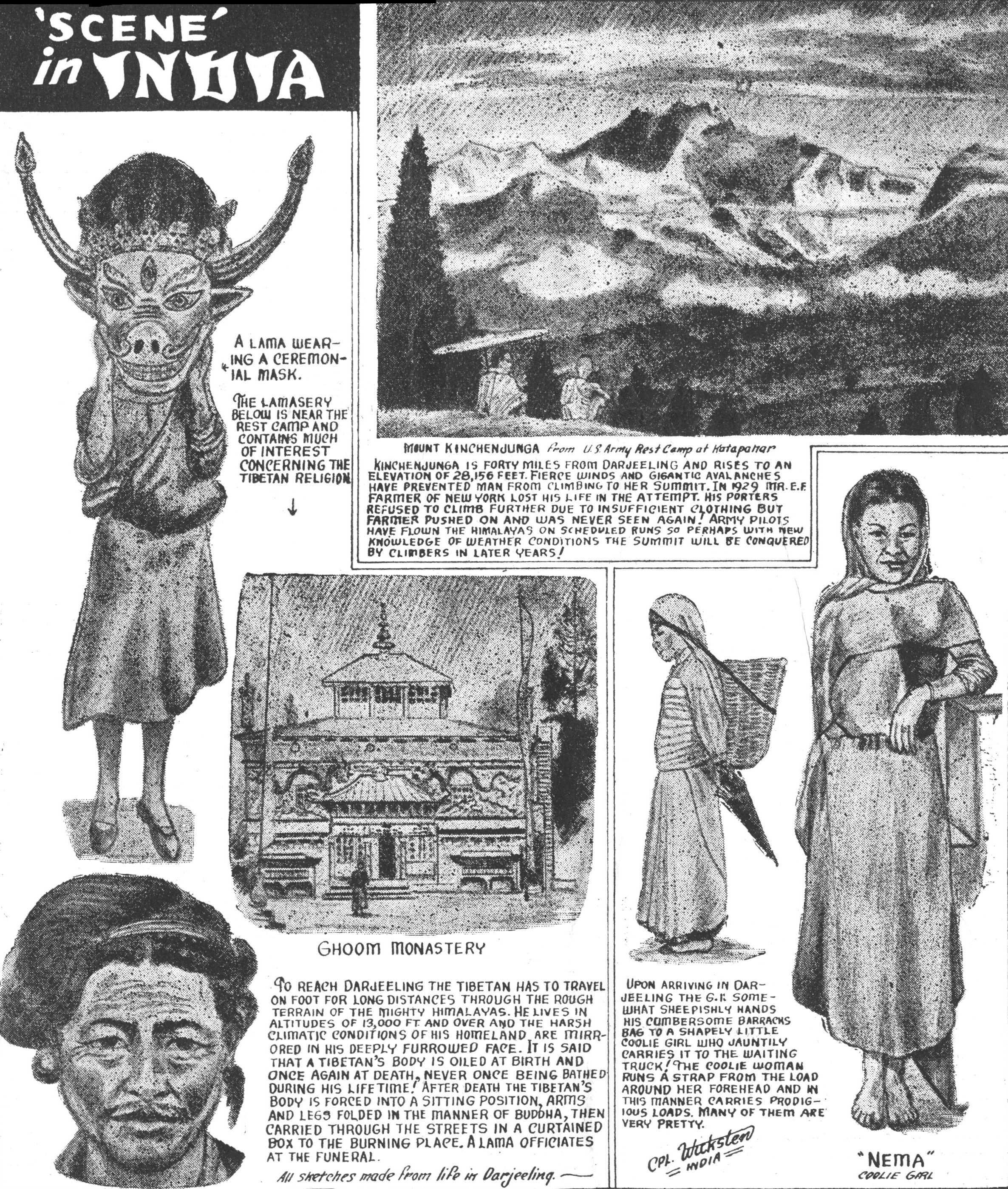
ENLARGE IMAGE |
|
ROVING REPORTER
The Roving Reporter waxed curious this week and wondered how some of the men felt about their military career so he ambled out and asked: "If you had it to do over again which branch or arm of the service would you choose?"
CAPT. MORRIS W. ZOOGMAN, QMC - The Quartermaster Corps. That's where I'm assigned and that's the department for me. It wouldn't matter what type of outfit we served or where just as long as I'm in the Quartermaster Corps.
CPL. DONALD W. CAMPBELL, HQ UNIT - Who said anything about choosing? I was drafted. If I could choose I'd rather be with a combat engineering division where the going isn't as soft, but where men are treated like they have hair on their chest, not fuzz.
PFC. KENNETH B. SAWYER, AACS - I'm in communications but I'd rather be in an Air Combat for I don't like this behind-the-line service. The Air Corps. is rough in spots but when I think of the Infantry, I'm satisfied for I want my fighting in the air and not out of those bathtub foxholes.
PFC. VERLIE R. BURRIS, ORDNANCE - The same one I'm in. Before I entered the Army I worked two and a half years in Ordnance with the War Department. So I fit right in with my job assignment now. Many of the fellows don't so I guess I'm lucky.
S/SGT. WALTER S. HINCKLEY, SIGNAL CORPS. - The Wac.
|
|
Sports Stars Amuse With Humor A merry USO unit convulsed an audience Monday night at the Post Theatre when sports stars Henry Armstrong, Kenny Washington, Joe Lillard, Bill Yancey, and writer Dan Burley presented their Special Sports Review. Dan Burley, managing editor and sportswriter for the New York Amsterdam News, MC'd the program and first introduced Bill Yancey of baseball and basketball fame. Yancey interspersed his experiences with a mirth provoking wit and answered all and sundry sport questions flung by the audience. Joe Lillard, ex-All-American footballer from Oregon U. tackled the 'mike' next and place-kicked his infectious jollity everywhere. From here it was anybody's giggle game with laughs tearing around right end, through the center, and beyond all sane normal goal posts. Kenny Washington, former UCLA All-American footballer, broke from the wings of the theatre next and matched tit for tat with Lillard as both of them ranged from stooge to straight man with sports being wedged in between. Hank Armstrong, that streak of jagged lightning who won the featherweight, lightweight, and welterweight boxing crowns, gave a brief demonstration of exploding fists as he boxed his shadow to a draw and figuratively killed the punch in a punching bag as he thrummed it around. The gleeful festivities ended with both the performers and the audience singing to the welkin as Dan Burley unraveled many musical compositions he'd composed and restrung them boogie-woogie style to ecstatic threads of jive. Chat-A-Jee AC Wins, Loses Two During the week the C A J softball team won two and lost two. This brings their record to three and three. Last Friday they took on a combination Sad Sack-Sulton outfit and set them back 6 - 3. Pitcher Young was the hero of this game. An Airdrome team set Young back with a 7 - 3 drubbing. On Thursday evening the Blockbuster outfit from Calcutta came down and actually trampled on the CAJ. Twice they ran out of the baseline to run into Higgins who was playing first base. An incident was narrowly averted the second time this happened. The CAJ lost this game 5 - 0 but the game scheduled for Saturday with the same team was cancelled for obvious reasons. The second victory of the week for the team was gained at the expense of the Tigers. The hero of this game was McLam, converted infielder turned catcher. His rifle-like throws nailed numerous would-be base stealers, nipping in the bud rallies that were getting out of control. The score of this game was 8 - 7. The Chat-A-Jee A C team is composed of a group of men from the Falcons, Rebels and Sad Sacks, not necessarily from their ball teams but from the outfit. They will take on all comers at any time. Want a game? Call Cpl. McConeghy at 72. |

THE TIGER RAG is a weekly publication edited and written by and for the Enlisted Personnel and Officers of APO 492, and is under the direction of the Commanding Officer, COLONEL FRANK D. HACKETT and Public Relations Officer, MAJOR STUART R. PETERSEN. STAFF: EDITOR... Pfc. Hollis H. Estill; ASSISTANT EDITOR... Pfc. Art Goldberg; ART... T/5 Layton H. Wicksten; PHOTOGRAPHY... Sgt. Les Gurwitz. Statements or policies reflected through the columns of this publication under no circumstances are to be considered those of the United States Army. Articles submitted by Officers and Enlisted Men represent personal opinions only. Internet adaptation by Carl W. Weidenburner.


|
Copyright © 2015 Carl Warren Weidenburner
SEE THE ORIGINAL
TOP OF PAGE ABOUT TIGER RAG PRINT THIS PAGE E-MAIL COMMENTS
CLOSE THIS WINDOW
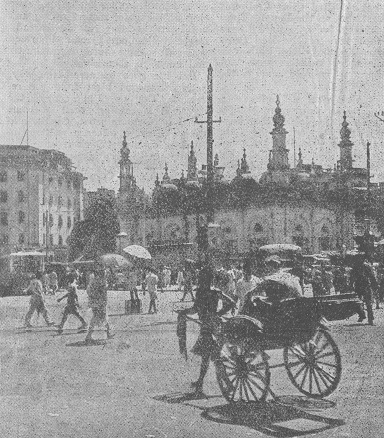 One of the busiest intersections in Calcutta, where Dharamatola Street, Bentynck Street and Chowringhee Road meet.
The American soldier being pulled in the rickshaw provides the East-West contrast with the Mohammadan mosque in the background.
A continual traffic snarl caused by vehicles, trains, gharries, rickshaws and pedestrians makes the intersection a traffic policeman's nightmare.
One of the busiest intersections in Calcutta, where Dharamatola Street, Bentynck Street and Chowringhee Road meet.
The American soldier being pulled in the rickshaw provides the East-West contrast with the Mohammadan mosque in the background.
A continual traffic snarl caused by vehicles, trains, gharries, rickshaws and pedestrians makes the intersection a traffic policeman's nightmare.
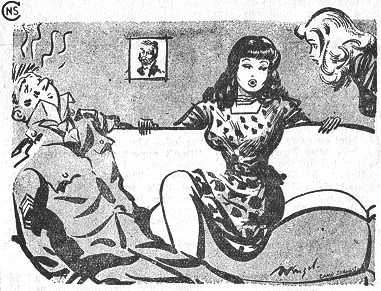
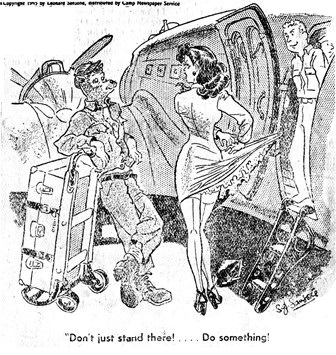
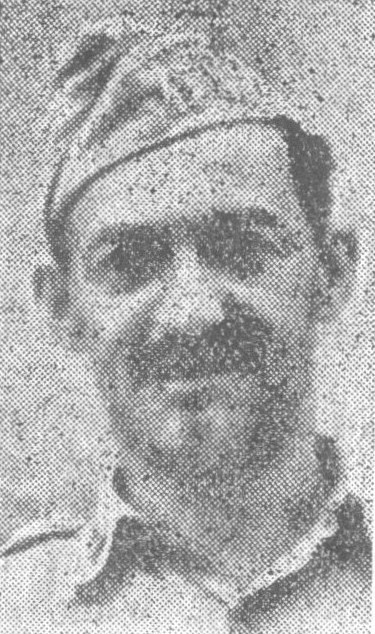
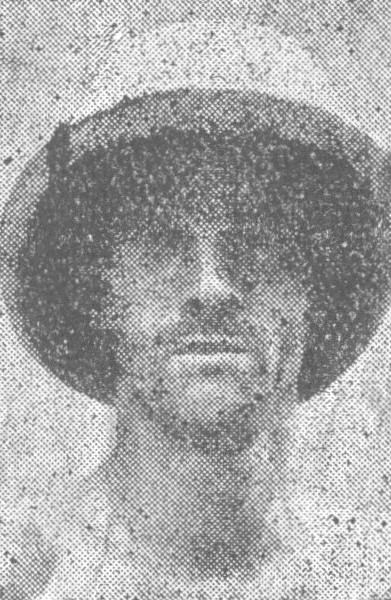
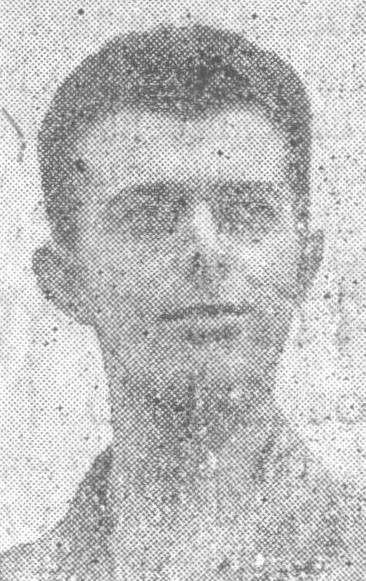
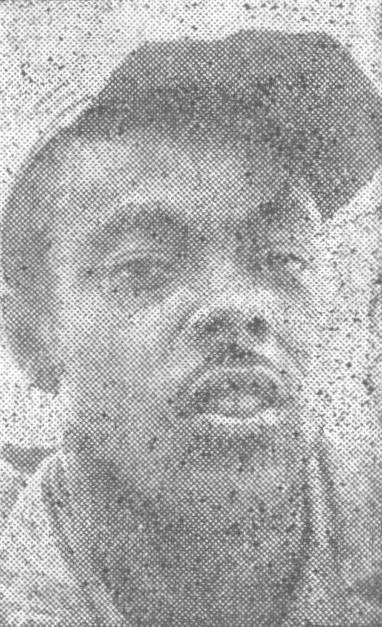
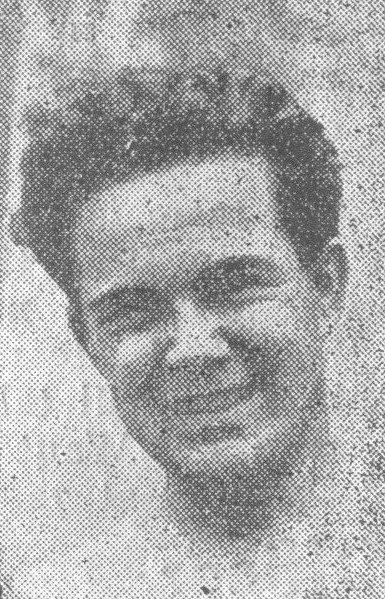 Burris
Burris
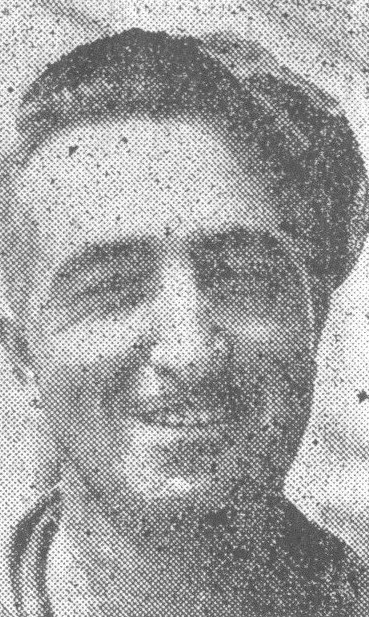 Hinckley
Hinckley
